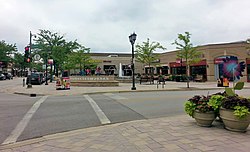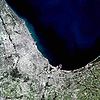
DuPage County is a county in the U.S. state of Illinois, and one of the collar counties of the Chicago metropolitan area. As of the 2020 census, the population was 932,877, making it Illinois' second-most populous county. Its county seat is Wheaton.

Bensenville is a village located near O'Hare International Airport in DuPage County, Illinois, with a portion of the town in Cook County. As of the 2020 census, the village population was 18,813.

Berkeley is a village located in Cook County, Illinois, United States. Incorporated in 1924, the population at the 2020 census was 5,338.

Brookfield is a village in Cook County, Illinois, United States, located 13 miles (21 km) west of downtown Chicago. Per the 2020 census, the population was 19,476. The city is home to the Brookfield Zoo.

Dolton is a village in Cook County, Illinois, United States. The population was 21,426 at the 2020 census. Dolton is located just west of the expressway Interstate 94 and immediately south of the city limits of Chicago. Its most common ZIP code is 60419.
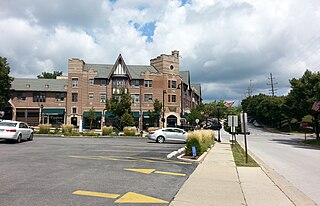
Flossmoor is a village in Cook County, Illinois, United States. The population was 9,704 at the 2020 census. Flossmoor is approximately 24 miles south of The Loop/Downtown Chicago. It is closely tied to neighboring Homewood, sharing a high school and park district.

Hanover Park is a village in Cook and DuPage counties in the U.S. state of Illinois, a suburb of Chicago. The population was 37,470 at the 2020 census. Ontarioville is a neighborhood within the village.

Harvey is a city in Cook County, Illinois, United States. The population was 20,324 at the 2020 census.

Homewood is a village in Cook County, Illinois, United States. The population was 19,463 at the 2020 census.
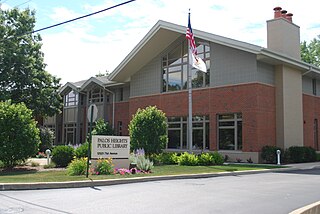
Palos Heights is a city in Cook County, Illinois, United States. It is a southwest suburb of Chicago. Per the 2020 census, the population was 12,068.

Prospect Heights is a city in Cook County, Illinois, United States and is a suburb of Chicago. Per the 2020 census, the population was 16,058.
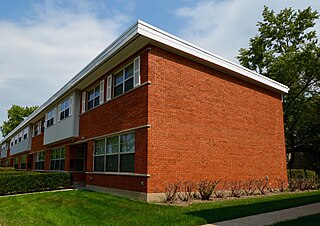
Riverdale is a village in Cook County, Illinois, United States. The population was 10,663 at the 2020 census. The village shares its name with the bordering Riverdale neighborhood in Chicago.

Summit is a city in Cook County, Illinois, United States. The population was 11,161 at the 2020 census. The name Summit, in use since 1836, refers to the highest point on the Chicago Portage between the northeast-flowing Chicago River and the southwest-flowing Des Plaines River located just north of the city.
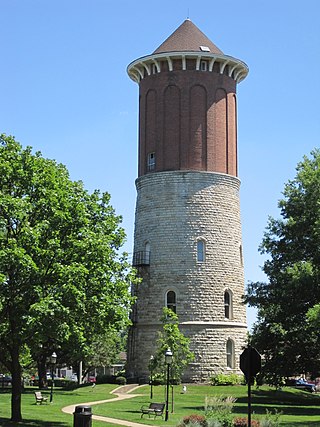
Western Springs is a village located in Cook County, Illinois, United States, and a suburb of Chicago. As of the 2020 census, the village had a total population of 13,629. It is twinned with Rugeley, Staffordshire, United Kingdom. In July 1962, the towns made telephone history on national television when the chairman of Rugeley Urban District Council made the first telephone call via the new Telstar satellite to the mayor of Western Springs.

West Chicago is a city in DuPage County, Illinois, United States. The population was 25,614 at the 2020 census. It was formerly named Junction and later Turner, after its founder, John B. Turner, president of the Galena and Chicago Union Railroad (G&CU) in 1855. The city was initially established around the first junction of railroad lines in Illinois, and today is still served by the Union Pacific West Metra service via West Chicago station.
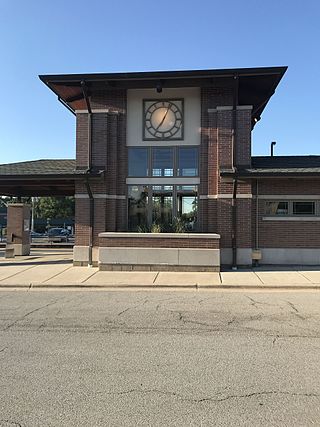
Wood Dale is a city in Addison Township, DuPage County, Illinois, United States. Per the 2020 census, the population was 14,012.
Grandwood Park is a census-designated place (CDP) in Warren Township, Lake County, Illinois, United States. Per the 2020 census, the population was 5,297.

Libertyville is a village in Lake County, Illinois, United States, and a northern suburb of Chicago. It is located 5 miles (8 km) west of Lake Michigan along the Des Plaines River. The 2020 census population was 20,579. It is part of Libertyville Township, which includes the village, neighboring Green Oaks, and portions of Vernon Hills, Mundelein, unincorporated Waukegan and Lake Forest, and part of Knollwood CDP. Libertyville neighbors these communities as well as Gurnee to the north and Grayslake to the northwest. Libertyville is about 40 miles north of the Chicago Loop and is part of the United States Census Bureau's Chicago combined statistical area (CSA).

Crystal Lake is a city in McHenry County, Illinois, United States. Named after a lake 1.6 miles (2.6 km) southwest of the city's downtown, Crystal Lake is 45 miles (72 km) northwest of Chicago. The population was 40,269 as of the 2020 census. Crystal Lake is the most populous city in McHenry County, part of the Chicago metropolitan area.

Addison Township is one of nine townships in DuPage County, Illinois, USA. As of the 2020 census, its population was 88,351 and it contained 32,306 housing units.
